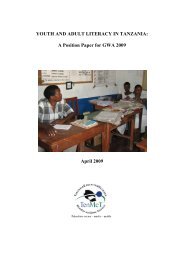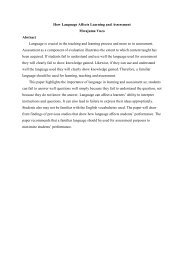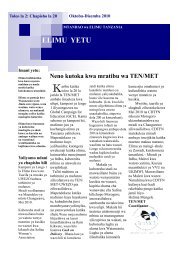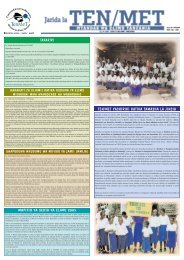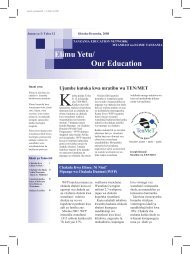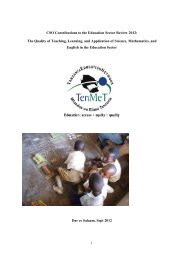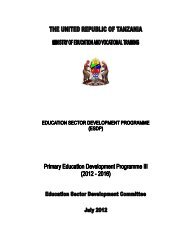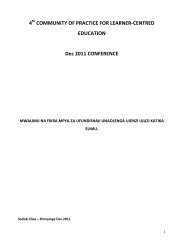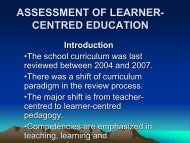A Simple Guide to Working with Finances in Education - Tanzania ...
A Simple Guide to Working with Finances in Education - Tanzania ...
A Simple Guide to Working with Finances in Education - Tanzania ...
Create successful ePaper yourself
Turn your PDF publications into a flip-book with our unique Google optimized e-Paper software.
• S<strong>in</strong>ce the m<strong>in</strong>istry or department, does not feel directly responsible for the f<strong>in</strong>albudget figures it has little commitment <strong>to</strong> the limits imposed.• Spend<strong>in</strong>g m<strong>in</strong>istries and departments will tend <strong>to</strong> commit funds asquickly as possible, for fear that later cuts will be imposed. They may even commitbeyond their official spend<strong>in</strong>g limits. The recently <strong>in</strong>troduced computerized systemof government Local Purchase Orders <strong>in</strong> <strong>Tanzania</strong> is meant <strong>to</strong> put an end <strong>to</strong> this,as it is not possible <strong>to</strong> order someth<strong>in</strong>g if there isn’t the money <strong>to</strong> pay for it.• M<strong>in</strong>istries and departments have no <strong>in</strong>centive <strong>to</strong> make sav<strong>in</strong>gs. Each agencyneeds <strong>to</strong> fully spend its budget by any means necessary. To avoid underspend<strong>in</strong>g,there is often a surge <strong>in</strong> agency spend<strong>in</strong>g <strong>in</strong> the last quarter, often onitems which are not very high priority.4.1.5 Unrealistic revenue projectionsThese may make the problem worse, because the amount that f<strong>in</strong>ally is available <strong>to</strong>spend<strong>in</strong>g m<strong>in</strong>istries or departments is not <strong>in</strong> l<strong>in</strong>e <strong>with</strong> what they expected and planned for.4.1.6 Departmental rather than programme or output orientationBudgets are prepared by, and for, adm<strong>in</strong>istrative units rather than on the basis of thegovernment’s objectives, programmes and activities. The first priority is keep<strong>in</strong>g theadm<strong>in</strong>istrative mach<strong>in</strong>ery runn<strong>in</strong>g smoothly, and often not enough is left for activities.This results <strong>in</strong> schools <strong>with</strong>out books, or <strong>in</strong>spection services <strong>with</strong>out fuel for theirvehicles so they cannot visit schools.4.1.7 Budget does not capture all spend<strong>in</strong>gIt was said above (3.4) that a good budget is ‘comprehensive’ mean<strong>in</strong>g that everyth<strong>in</strong>gon which government spends money is <strong>in</strong>cluded. If the budget does not give a fullpicture it is very difficult <strong>to</strong> see whether spend<strong>in</strong>g allocations are be<strong>in</strong>g made <strong>in</strong> l<strong>in</strong>e <strong>with</strong>stated policy priorities. Commitments <strong>to</strong> parastatals are often not covered <strong>in</strong> the budget.Until recently most donor support came <strong>in</strong> the form of projects, which meant thatgovernment didn’t actually know how much was be<strong>in</strong>g spent. There is more about thisbelow.4.2 The impact of external aidImplementation of governmentpriorities may be held back by theway donors or developmentpartners work.How many of theseproblems are also true ofNGOs?What can be doneabout it?16



